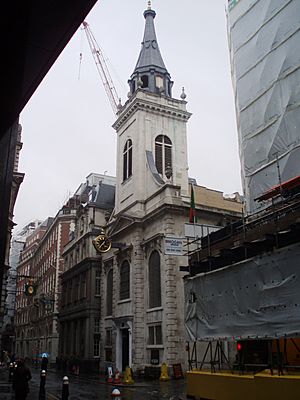St Edmund, King and Martyr facts for kids
Quick facts for kids St Edmund King and Martyr |
|
|---|---|
| Saint Edmund the King and Martyr | |

Photo of the church today
|
|
| Location | Lombard Street, London EC3V 9EA |
| Country | England |
| Denomination | Church of England |
| Previous denomination | Roman Catholic |
| Website | https://www.lombardchurches.org/ |
| Architecture | |
| Functional status | Consecrated but no regular worship |
| Heritage designation | Grade I |
| Architect(s) | Sir Christopher Wren |
| Style | Baroque |
| Administration | |
| Deanery | City of London |
| Archdeaconry | London |
| Episcopal area | Two Cities |
| Diocese | London |
St Edmund, King and Martyr is an Anglican church. It stands on Lombard Street in the City of London. The church is named after Saint Edmund the Martyr. Since 2001, it has been a centre for spiritual learning. This centre is now called the London Centre for Spiritual Direction. Even though it's a centre, it is still a consecrated church. A group called Imprint Church has held regular worship services there since 2019.
The church is located in the ward of Langbourn. You can find a community noticeboard for the ward outside the church.
Contents
History of St Edmund's Church
The church was first mentioned in records in 1292. It was known as 'Saint Edmund towards Garcherche'. Later, in 1348, it was called 'Saint Edmund in Lombardestrete'. An old book from 1598 also referred to it as St Edmund Grass Church.
The Great Fire and Rebuilding
The original medieval church was destroyed in the Great Fire of London in 1666. After the fire, its parish joined with St Nicholas Acons. That church was also destroyed and never rebuilt. The current church was designed by Sir Christopher Wren. It was built between 1670 and 1679.
The church tower has special decorations. These are flaming urns at the corners. They remind people of the Great Fire. One person said the tower looked "more Chinese than Italian." Another called it "rather handsome." The church is unusual because its altar faces north, not east.
Notable Events at the Church
The famous writer Joseph Addison was married here in 1716. In September 1868, people gathered outside the church. This happened because of sermons given by Rev. J. L. Lyne. He had spoken negatively about the traders on Lombard Street.
Restoration and War Damage
The church was repaired in 1864 and again in 1880. On July 7, 1917, during a daylight air raid in World War I, a bomb hit St Edmund's. It destroyed the main roof beam. The church needed a lot of repairs and reopened on October 1, 1919. Some pieces of the German bomb are still kept in the church. More damage happened during the 1941 London Blitz from incendiary bombs.
The church was officially named a Grade I listed building on January 4, 1950. This means it is a very important historic building.
Past Leaders of the Church
Many important people have served as rectors (leaders) of this church. These include Thomas Lyndford, who was a chaplain to King George I. Another was Jeremiah Milles, who led the Society of Antiquaries.
After World War I, Geoffrey Studdert Kennedy became the leader of St Edmund, King and Martyr. He later worked for the Industrial Christian Fellowship. He traveled around Britain giving speeches. He became ill on one of these tours. He passed away in Liverpool in 1929 at age 45. Many poor people attended his funeral.
St Edmund's Church Today
Today, the church is part of a larger group of parishes. This group includes St Edmund the King and Martyr and St Mary Woolnoth Lombard Street. It also includes several other churches that did not survive. Only St Edmund and St Mary Woolnoth are still standing.
The church is part of the Church of England's Diocese of London. It also houses the office for the Bishop of Islington.
Gallery
See also
 | Janet Taylor Pickett |
 | Synthia Saint James |
 | Howardena Pindell |
 | Faith Ringgold |




